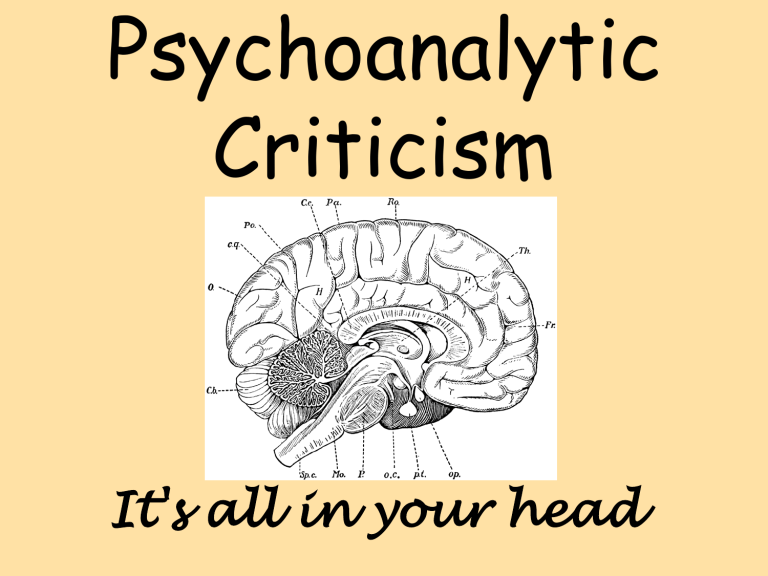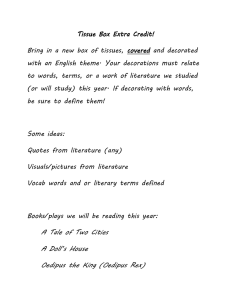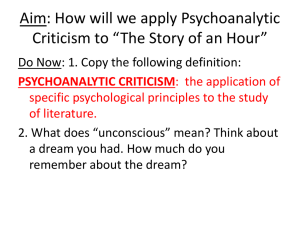
Psychoanalytic
Criticism
It's all in your head
Psychoanalytic
Approaches to
Literature
(1) Structure of the Mind, Child
Development & Oedipus Complex
(2) Dream and Sexual Symbols
(3) Psychological Diseases
FREUD'S MAIN IDEAS
Freud's couch. Photograph: David Sillitoe guardian.co.uk
First developed as
a psychological
/therapeutic
method by Sigmund
Freud (1856-1939)
in Austria.
http://www.holocaustresearchproject.org/ghettos/freud.html
Three Premises
1. most of the individual's mental processes are
unconscious.
2. all human behavior is motivated ultimately by
what we would call sexuality. The prime psychic
force--libido, or sexual energy.
3. Because of the powerful social taboos attached to
certain sexual impulses, many of our desires and
memories are repressed.
unconscious
--cannot be pointed at; can only be
"diagnosed."
--the reverse of consciousness
Making itself manifest through "gaps"-unintended lapses in memory, slips of
tongue, puns and dreams
Structure of our Psyche
Superego
morality p.
repository of
conscience &
pride
reason and
morality
circumspection
protect society
• Ego
Id
pleasure p.
•reality p
repository of
•Intermediary
libido
instinct and
passion
• protect
self-satisfaction
individual
Child development
oral stage
anal stage
latent period
phallic stage
genital stage
What is happening in this process ... is a gradual
organization of the libidinal drives . . .
Oedipus complex and gendering process
With Oedipus complex starts the process of
socialization
Child development (2)
oral stage
(sucking)
anal stage
(withholding, expulsion)
phallic stage
(castration complex)
latent period
Auto-eroticism
genital stage
puberty
Oedipus complex
(positive and negative
constellation)
Child development (2)
Oedipus complex in Boys
Positive constellation:
identifies with Father, loves
Mother
Negative constellation:
identifies with Mother and
loves Father
Oedipus complex in Girls
loving Mother
loving Father
Loving Father and
identifying with Mother.
Child development (3): Beyond
Freud
Pre-Oedipal
Symbiosis
(Identification
with Mother)
Oedipus
Complex & its
resolution
Transitional Objects
(Object-Relation
Theory)
Key Issues in Freud’s Oedipus
Complex
Recognition of Father’s authority
Development from bi-sexuality to
heterosexuality
The influence of sexuality, parents and
childhood on our personality
Are we born to be destructive and aggressive?
Is sexuality the source of our energy?
Books, Stories, and Plays
Featuring Oedipus Complex
1.
2.
3.
4.
Sons and Lovers by D.H. Lawrence
Hamlet by William Shakespeare
“Araby” by James Joyce
Long Day’s Journey into Night by Eugene
O’Neill
5. Catcher in the Rye by J.D. Salinger
6. Psycho by Alfred Hitchcock
PSYCHOANALITICAL
LITERARY THEORY
is based on the idea that
“the unconscious, like the poem, or novel, or
play, cannot speak directly and
explicitly but does so through
images, symbols, emblems, and
metaphors”
(Barry 102).
What Do Psychoanalytic Critics Do?
Look for the “covert” or hidden content beneath the “overt” or surface
content of the text
Pay close attention to the unconscious motives and feelings of either
author or characters
Demonstrate classic psychoanalytic symptoms
in the text (such as oral, anal, and phallic
stages, or the Oedipus complex, etc.)
Analyze literary history as if it is one psyche
Prioritize “psycho-drama” (conflicts between
characters) rather than “social drama”
(historical, political conflicts, etc.)
Main Question:
How do unconscious
desires (of the
author or characters)
shape this literary
work?
[possible] Positives
It focuses on human problems, not just
formal ones
It may be applicable to real life emotional,
mental, or relational situations
It's super fun to read literature and get to
talk about sex and crazy people.
[possible]
Negatives
It is very easy to fake.
It is extremely subjective.
It assumes that all human beings are
driven by repressed, illicit sexual urges
and is, therefore, a very negative view
of human nature.
IT'S ALL IN YOUR
HEAD
IT'S ALL
ABOUT SEX
Two Questions
I. A professor of mine once said: “The
better a poet is, the more likely you are to
be able to discover his/her intention; that
is, the one single meaning of the poem.”
Is this a valid measure of literary quality?
II. Would you like using this “objective”
approach to understanding poetry, or do
you prefer a more “subjective” approach?
Sources
Barry, Peter. Beginning Theory: An Introduction to Literary and
Cultural Theory. 2nd edition. NY: Manchester UP, 2002.
Bressler, Charles E. Literary Criticism: An Introduction to Theory and
Practice. 4th ed. Upper Saddle River, NJ: Pearson Prentice Hall,
2007.
Eliot, T. S. “Hamlet” in Eliot: Poems and Prose. NY,
Knopf/Everymanm 1998. 131-140.
- - - . “The Metaphysical Poets” (1921) in The Norton Anthology of
Theory and Criticism. 1098-1105.
- - - . “Tradition and the Individual Talent” (1919) in Criticism:
Major Statements. 404-410.
Kaplan, Charles and William Davis Anderson, eds. Criticism: Major
Statements. 4th edition. Boston, Bedford/St. Martin’s, 2000.
Leitch, Vincent B., gen. ed. The Norton Anthology of Theory and
Criticism. NY: Norton, 2001.





